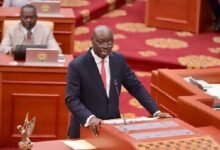ILO urges fisheries associations to formulate decent work policies

The International Labour Organisation (ILO), Ghana, has encouraged associations in the fisheries sector to formulate policies on ILO Convention 188, to eliminate forced labour and promote decent work.
The Work in Fishing Convention (C188), currently being ratified by Ghana, aims to ensure that fishers have decent work conditions on board fishing vessels with regard to minimum requirements for work on board.
It also touches on accommodation and food; occupational safety and health; medical care and social security and applies to all fishers and fishing vessels engaged in commercial fishing operations.
According to the ILO National Programme Coordinator for the 8.7 Accelerator Lab Programme, Emmanuel Kwame Mensah, the policies, when developed, would aid effective implementation of the provisions outlined in the convention and ensure that fishers had decent conditions of work.
He made the call on Monday when he visited the associations to engage them on the implementation of the C188, find out their plans for the year and present awareness creation materials to them.
The associations included the National Fisheries Association of Ghana (NAFAG), Ghana Industrial Trawlers Association (GITA), National Union of Seamen, Ports and Allied Workers (NUSPAW) and Ghana Tuna Association (GTA).
The 8.7 Accelerator Programme is an initiative of the ILO meant to speed up efforts to meet Target 8.7 of the Sustainable Development Goals (SDGs), to achieve economic growth and decent work for all.
Mr Mensah said the C188 was critical to the human resource in the sector for which reason the ILO would provide technical support for the drafting of the work policies at both company and association levels.
By the end of the second quarter, he said the draft policies should be ready.
He urged the associations to support the operations of employer’s laboratory, a platform meant to provide solutions to challenges in the sector especially on decent work.
In order for the associations to receive more support from the ILO, Mr Mensah asked them to sign up with the Ghana Employers Association, which is ILO’s focal person in Ghana.
He also urged the associations to develop a database of all fishers in the sector to help trace them easily, pass on information faster as well as address issues with recruitment.
Mr Mensah said the ILO was planning more engagements in the coming weeks on C188 and the Accelerator Programme to deepen the knowledge of stakeholders on issues pertaining to decent work.
“We have to work together to implement international standards in the fishing industry and to eliminate force labour and human trafficking in the marine fishing industry,” he said.
Leaders of the respective associations assured the ILO of their commitment to the implementation of the C188 as well as collaboration to resolve other related challenges in the sector.
FROM JONATHAN DONKOR, TEMA


